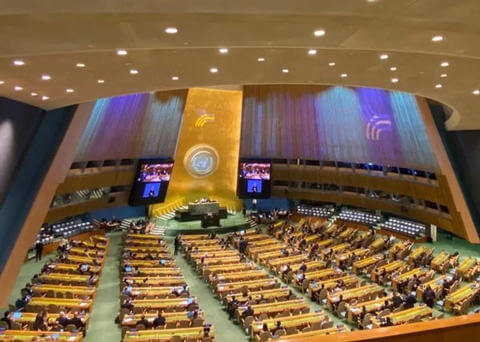African and US Imperatives and Interests are Reshaping African Diaspora Engagement

Howard on Africa In-Brief
A publication of the Center for African Studies, Howard University
African and US Imperatives and Interests are Reshaping African Diaspora Engagement
Written by Krista Johnson, Ph.D.
Oct 17, 2024
The role of the African diaspora in forging important ties with African countries and the continent as a whole was front and center at this year’s United Nations General Assembly (UNGA) sessions, and particularly the Summit of the Future convened the week before. Priorities for African countries, at UNGA and beyond, center on African development, trade and investment and pan-African, continental integration. United States government priorities for African engagement continue to prioritize bilateral relations with select African countries, and an overall strategy to counter Chinese and, to a lesser extent, Russian influence on the continent. In recent years, these imperatives and interests have led to greater courting of the new African diaspora in discussions and practices of African diaspora engagement, with potentially important implications for intra-diaspora alliances and priorities for a global African agenda.
In the Americas, the African diaspora dates back to at least 1619 with the arrival of the first enslaved Africans. This historic diaspora, descended from enslaved Africans, numbers more than 200 million. In the post-independence era a new global African diaspora has emerged, now numbering between 15-20 million. In the United States the new African diaspora now constitutes over 10 percent of the black population and are the fastest growing segment of the black American demographic. Indeed both the old and new diasporas have diverse commitments to Africa. How, where and why they engage with the continent varies, as do the issues that each prioritize.
For example, given it’s positionality, its history of enslavement, racial discrimination and marginalization, the historic diaspora is especially atuned to issues around human rights, racial and social justice and self-determination and has consistently been engaged with the African continent around these issues. Beginning with their vehement denouncement of colonialism and imperialism, historic African diaspora communities in the United States and the Americas have been at the forefront of the struggles for African independence. Indeed it was the historic African diaspora that formulated and advocated pan-Africanism as a distinctive internationalism, which anchored solidarities and engagement in people and communities over nation-states.
The global anti-apartheid movement, led by the historic African diaspora, and contemporary movements such as Black Lives Matter (BLM) #EndSARS are notable examples of pan-African mobilization around racial justice, state-sponsored violence, and human rights. At the international level, most recently through the UN Permanent Forum on People of African descent, the historic African diaspora has consistently elevated the issues of reparations and anti-racism. In the post-independence era, the political and economic clout of African Americans in the United States and of Caribbean nations in international fora made these constituencies natural allies to be courted by African governments.
In recent years we have seen greater attention placed on the new African diaspora, fueled in part by a new articulation of pan-Africanism emanating from the continent and the urgent and unrelenting pressure for African development. The developmentalist and neo pan-African paradigms have found articulation in political campaigns, such as that of recently elected Senegalese president Bassirou Diomaye Faye, a self-described ‘left pan-Africanist’ whose campaign committed to abandoning the CFA franc and prioritizing regional integration. Senegal’s foreign ministry has also seen a name change to Ministry of African Integration and Foreign Affairs. Neo pan-Africanism has also found expression in the proliferation of African country commissions on the African diaspora.
Such neo pan-Africanism is understandably drawn to the economic power and growing political maturity of the new African diaspora. We see, for example, a bigger spotlight is being shone on the economic importance of diaspora remittances that support African economies. In 2023, for example, Nigeria, the top recipient of remittances, received almost USD20 billion, while Ghana received USD4.6 billion and Kenya USD4.2 billion. On average remittances account for approximately 7.6% of GDP in West Africa. These trends speak to the significant economic clout and engagement of the new African diaspora with their countries of origin.
At the national level the US government is also honing in on the new African diaspora as a tool of soft power in its foreign policy. In 2023 the President’s Advisory Council on African Diaspora Engagement was established, comprised of prominent and elite individuals, and intended to facilitate African diaspora engagement with US policymakers and the African continent. As the US government continues to pursue an Africa strategy of strengthening bilateral ties with individual African countries and promoting trade and investment with the aim of countering the influence of China, the new African diaspora is incentivized to rapidly mobilize along national lines.
In sum, recent developments portend a multiplicity of African diaspora engagements and a reinvigorated Pan-African agenda. Global and geopolitical imperatives support a global African agenda that is state-centered and geographically rooted on the continent. The challenge for the African diaspora is to amplify articulations of Pan-Africanism that are people-centered and promote intra-diaspora alliances and understandings. The Global African agenda should not give in to, or replicate, the legacies of imperial hierarchy and practices of ethnicizing and politicizing differentiation that have been the foundation of dependency and domination in the international system. This will require frank conversations that acknowledge diverse concerns and perspectives, as well as clear strategies to mitigate external imperatives that privilege certain groups and pit some African diaspora constituencies against others.
Krista Johnson, Ph.D. is a professor in the Department of African Studies and the director of the Center for African Studies at Howard University.
Acknowledgements:
Howard on Africa in Brief is published by the Center for African Studies at Howard University. Contributors include prominent scholars, policy makers, Howard faculty, alumni and graduate students. Our papers provide open access to research and make a global contribution to understanding Africa-related issues. The views, positions, and conclusions expressed in this publication are solely those of the author(s).
